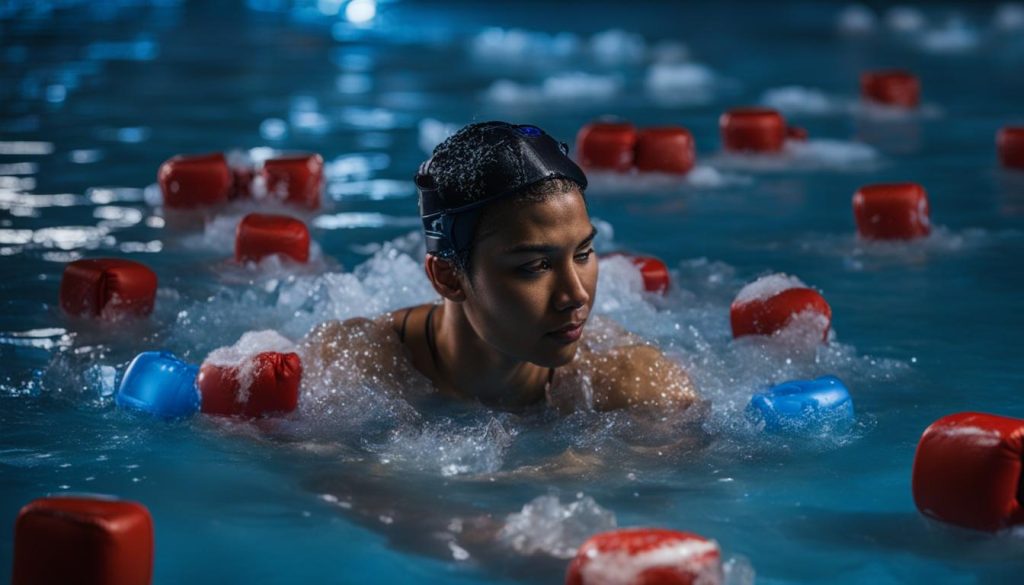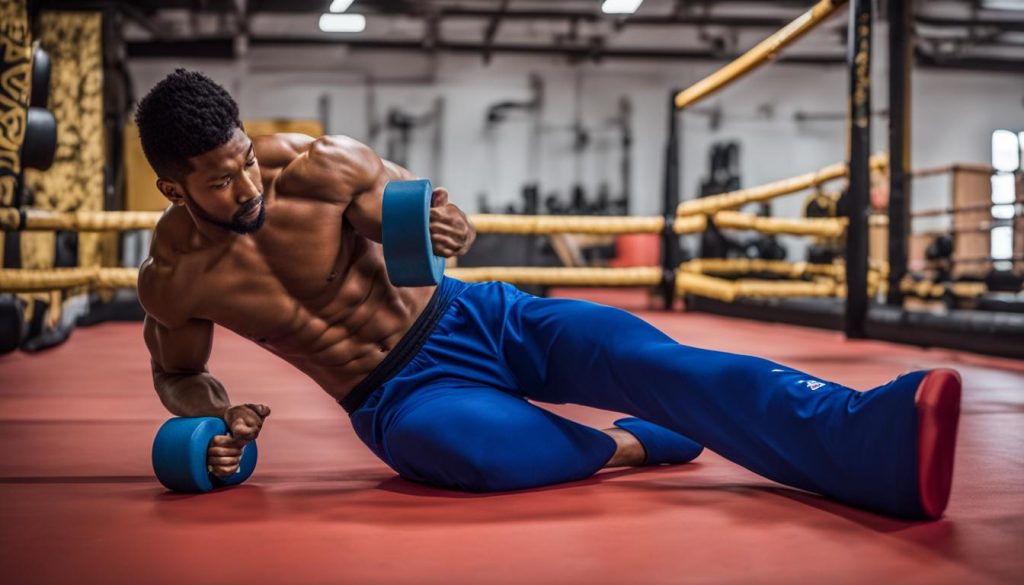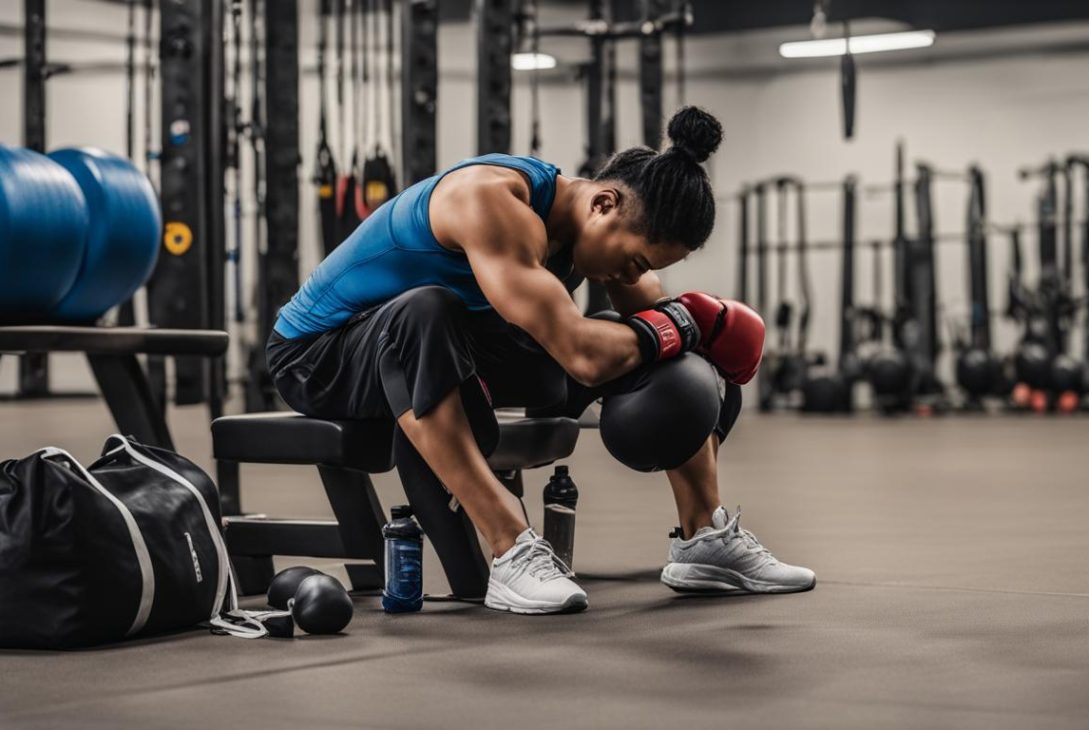Muay Thai is a physically demanding sport that requires intense training, rigorous sparring sessions, and proper recovery to ensure optimal performance and avoid injuries. In this article, we will explore effective strategies for healing after Muay Thai fights, including training tips, sparring recovery, and overall post-fight healing techniques. By incorporating these methods into your routine, you can enhance your recovery, prevent injuries, and continue to thrive in the world of Muay Thai.
Key Takeaways:
- Proper healing and recovery strategies are essential for Muay Thai fighters to avoid injuries and perform at their best.
- Training tips, such as progressive overload and structured conditioning, can help improve your performance and reduce the risk of injury.
- Implementing sparring recovery techniques, such as icing, stretching, and active rest, can aid in muscle repair and reduce soreness.
- Post-fight healing techniques, including cold water immersion, foam rolling, yoga, and active recovery, can optimize your recovery process.
- Remember to prioritize sleep, nutrition, hydration, and stress management to support your overall healing and performance in Muay Thai.
The Importance of Recovery in Muay Thai
Recovery is a fundamental aspect of Muay Thai training and fighting, playing a crucial role in preventing injuries and maintaining optimal performance. The physical demands of this combat sport, which involves strikes using various body parts, can put significant stress on the muscles and joints. Adequate recovery strategies are necessary to promote healing and prevent overuse injuries. By prioritizing recovery, fighters can ensure long-term success in their Muay Thai journey.
One of the primary reasons recovery is essential in Muay Thai is injury prevention. The repeated impact from kicks, punches, elbows, and knees can lead to muscle soreness, strains, and other injuries if not properly addressed. Recovery allows the body to heal damaged tissues, repair muscle fibers, and reduce inflammation. By incorporating effective recovery techniques into their training routine, fighters can minimize the risk of injuries and maintain their performance at an optimal level.
Additionally, recovery in Muay Thai helps enhance overall well-being. Intense training and fights can take a toll on the body and mind, leading to physical and mental fatigue. Adequate recovery allows fighters to rest and recharge, reducing the risk of burnout and improving their mental clarity and focus. It also helps regulate stress levels and promotes a positive mindset, which is crucial for optimal performance in the ring.
To maximize recovery in Muay Thai, it is essential to incorporate various strategies such as proper sleep, nutrition, hydration, stress management, and targeted recovery techniques like cold water immersion, foam rolling, and yoga. Each of these aspects plays a vital role in supporting the body’s healing and adaptation process. By prioritizing recovery alongside training and fighting, Muay Thai fighters can optimize their performance, prevent injuries, and ensure long-term success in the sport.
The Power of Sleep in Muay Thai Recovery
Sleep is a crucial component of the recovery process for Muay Thai fighters. Quality sleep allows the body to repair damaged tissues, relax muscles, and release hormones that aid in the healing process. It is recommended that fighters aim for 7-9 hours of sleep per night to optimize their recovery. Additionally, incorporating power naps into their routine can be beneficial, especially for fighters with irregular or intense schedules.
During sleep, the body undergoes various essential processes that promote healing and recovery. In the REM (rapid eye movement) phase of sleep, muscles relax, and repair processes are initiated. This phase is particularly crucial for Muay Thai fighters, as it helps reduce muscle soreness and inflammation, allowing the body to recover faster.
To improve sleep quality, fighters can establish a regular sleep schedule and create a conducive sleep environment. This includes keeping the bedroom cool, dark, and quiet, as well as avoiding screens and stimulating activities before bedtime. Establishing a relaxing bedtime routine, such as reading or practicing deep breathing exercises, can also help signal to the body that it is time to sleep.
The Benefits of Sleep in Muay Thai Recovery:
- Enhances muscle repair and recovery
- Reduces muscle soreness and inflammation
- Optimizes hormone release for healing
- Improves overall physical and mental well-being
- Boosts immune function
Incorporating adequate sleep into a recovery plan is essential for long-term performance and injury prevention in Muay Thai. By prioritizing sleep, fighters can ensure their bodies have the necessary time and resources to heal and recover from the physical demands of training and fights.

Nutrition for Effective Recovery in Muay Thai
Proper nutrition is crucial for effective recovery in Muay Thai. The intense physical demands of training and fighting require the body to have an adequate supply of nutrients to repair damaged tissues and replenish energy stores. By focusing on a balanced diet that includes lean meats, fish, fruits, vegetables, and whole grains, fighters can provide their bodies with the necessary nutrients for optimal recovery.
Eating small, frequent meals every 2-3 hours throughout the day is recommended to maintain a steady supply of nutrients and prevent energy slumps. Incorporating protein-rich foods such as chicken, turkey, tofu, or legumes into each meal is essential for muscle repair and growth. Pairing these proteins with glycogen-rich carbohydrates like sweet potatoes, quinoa, or brown rice will ensure that fighters have enough energy for their training sessions and aid in muscle recovery.
In addition to macronutrients, it’s important for Muay Thai fighters to stay properly hydrated. Drinking enough water throughout the day supports muscle function, regulates body temperature, and aids in the removal of waste products from the body. Electrolyte-rich drinks or coconut water can also be beneficial for replenishing minerals lost through sweat during training or fights. Proper nutrition and hydration are key elements in helping fighters recover quickly and perform at their best in the ring.
The Role of Nutrition in Muay Thai Recovery
Nutrition plays a significant role in the recovery process for Muay Thai fighters. Here are some benefits of proper nutrition:
- Supports muscle repair and growth
- Provides energy for training sessions and fights
- Enhances immune function
- Aids in the removal of waste products from the body
- Keeps the body properly hydrated
“Proper nutrition is the foundation of effective recovery in Muay Thai. By fueling your body with the right nutrients, you can optimize your healing process and perform at your best in the ring.”
In summary, nutrition is a critical component of recovery in Muay Thai. By following a balanced diet that includes lean proteins, carbohydrates, fruits, vegetables, and staying well-hydrated, fighters can support their bodies’ healing process and enhance their overall performance.
The Benefits of Cold Water Immersion in Muay Thai Recovery
In the world of Muay Thai, recovery plays a crucial role in optimizing performance and preventing injuries. One effective strategy for promoting healing and reducing muscle soreness and inflammation is cold water immersion. The application of cold water, whether through cold showers or immersing oneself in cold water, can bring about numerous benefits for Muay Thai fighters.
One of the key advantages of cold water immersion is its ability to reduce muscle soreness. The cold temperature helps constrict blood vessels and decrease the flow of inflammatory substances, resulting in a reduction of pain and swelling. By immersing yourself in cold water after a tough training session or fight, you can expedite the recovery process and get back to training sooner.
In addition to reducing muscle soreness, cold water immersion also aids in the recovery of muscle damage. The cold temperature stimulates the body’s natural healing processes, promoting the repair of damaged tissues and enhancing overall range of motion. Incorporating cold water immersion into your post-fight or post-training routine can have significant benefits for your overall recovery.

The Benefits of Cold Water Immersion:
- Reduces muscle soreness
- Aids in the recovery of muscle damage
- Decreases inflammation
- Enhances overall range of motion
By integrating cold water immersion into your Muay Thai recovery routine, you can experience faster healing, reduced muscle soreness, and improved performance. It is important to note that cold water immersion should be done for short durations to avoid any negative effects on the body. Always consult with a healthcare professional or sports medicine specialist before incorporating any new recovery strategies into your routine.
Foam Rolling for Muscle Recovery in Muay Thai
Muay Thai fighters put their bodies through intense physical demands, which can lead to muscle soreness and tightness. Foam rolling, also known as self-myofascial release, is a highly effective technique for enhancing muscle recovery in Muay Thai. By using a foam roller to apply pressure to trigger points in the muscles, fighters can improve blood flow, increase muscle elasticity, and accelerate the recovery process.
Foam rolling works by breaking down adhesions and releasing tension in the muscle fascia, the connective tissue that surrounds and supports the muscles. This technique not only helps to alleviate muscle soreness and tightness but also improves range of motion, allowing for more fluid movement during training and fights.
Research has shown that just a few minutes of foam rolling can significantly enhance muscle recovery and increase range of motion by up to 10%. It is recommended to foam roll both before and after training sessions or fights to warm up the muscles, prevent injuries, and promote faster recovery. By incorporating foam rolling into their routine, Muay Thai fighters can optimize their muscle recovery and maintain peak performance in the ring.

The Benefits of Foam Rolling in Muay Thai Recovery
Foam rolling offers several key benefits for Muay Thai fighters:
- Promotes muscle recovery: Foam rolling helps to break up muscle knots and adhesions, improving blood flow and nutrient delivery to the muscles. This aids in the removal of metabolic waste products and facilitates the repair and regeneration of muscle tissue.
- Increases muscle elasticity: Regular foam rolling can enhance muscle elasticity, allowing fighters to move more freely and efficiently. This leads to improved performance, increased power, and reduced risk of muscle strains or pulls.
- Relieves muscle soreness: Foam rolling can help alleviate muscle soreness and tightness by reducing inflammation and promoting the release of endorphins, natural pain-relieving chemicals produced by the body.
- Prevents injuries: By addressing muscle imbalances and promoting proper alignment, foam rolling can help prevent injuries in Muay Thai. It can also improve joint stability and reduce the risk of overuse injuries caused by repetitive movements.
Tips for Incorporating Foam Rolling into Your Recovery Routine
Here are some tips to help you incorporate foam rolling effectively into your Muay Thai recovery routine:
- Select the right foam roller: Choose a foam roller that is firm enough to provide adequate pressure but not overly painful. A medium-density foam roller is generally a good option for most fighters.
- Focus on the major muscle groups: Prioritize foam rolling the major muscle groups used in Muay Thai, such as the quadriceps, hamstrings, calves, glutes, and upper back.
- Apply sustained pressure: Roll slowly over each muscle group, pausing on any tender or tight spots and applying sustained pressure for 30-60 seconds. Breathe deeply and try to relax the muscles as you roll.
- Gradually increase intensity: As your muscles adapt to foam rolling, you can gradually increase the intensity by using a firmer foam roller or incorporating trigger point balls or massage sticks for targeted areas.
- Combine with stretching and mobility exercises: Foam rolling works synergistically with stretching and mobility exercises. After foam rolling a muscle group, follow up with dynamic stretches or mobility drills to further improve flexibility and range of motion.
The Role of Yoga in Muay Thai Recovery
Yoga, known for its focus on mindfulness, breathing techniques, and relaxation, can play a significant role in the recovery process for Muay Thai fighters. By incorporating yoga into your training regimen, you can effectively manage the physical and mental stress associated with the sport, promote stress reduction, and improve overall well-being.
One of the key benefits of yoga in Muay Thai recovery is its ability to reduce cortisol levels. Cortisol, also known as the stress hormone, can hinder the body’s healing and recovery processes. By practicing yoga regularly, you can reduce cortisol levels, allowing your body to effectively heal and repair after intense training and fights.
Yoga also offers a range of stretching exercises that help improve flexibility and range of motion. By incorporating yoga poses and flows into your recovery routine, you can enhance muscle elasticity and reduce the risk of injuries. Additionally, the breathing techniques practiced in yoga can help improve oxygen flow to your muscles, aiding in their recovery and promoting relaxation.

Benefits of Yoga in Muay Thai Recovery:
- Promotes stress reduction and cortisol level management
- Improves flexibility and range of motion
- Aids in muscle recovery and relaxation
- Enhances overall well-being
The Power of Active Recovery in Muay Thai Muscle Healing
Active recovery is a crucial element in the healing process for Muay Thai fighters. Engaging in light workouts or activities on rest days promotes increased blood flow to muscles, which accelerates the healing process and reduces muscle soreness. Through active recovery, you can facilitate the removal of waste products that accumulate during intense training sessions, resulting in faster recovery times and improved overall performance.
Activities such as hiking, swimming, yoga, or light cardio are excellent options for active recovery in Muay Thai. These low-impact exercises help maintain cardiovascular fitness while minimizing stress on the joints and muscles. By incorporating active recovery into your training regimen, you not only promote muscle healing but also boost your mood and mental well-being.
Remember to listen to your body during active recovery. Pay attention to any signs of overexertion or pain and modify your activities accordingly. It’s essential to strike a balance between challenging yourself and allowing your body to recover adequately.
Benefits of Active Recovery in Muay Thai:
- Increased blood flow to muscles
- Accelerated healing process
- Reduced muscle soreness
- Maintained cardiovascular fitness
- Improved mood and mental well-being
By incorporating active recovery into your routine, you can optimize muscle healing, enhance performance, and reduce the risk of injuries. Make active recovery a regular part of your training regimen to reap these benefits and ensure long-term success in the world of Muay Thai.
Managing Stress for Effective Muay Thai Recovery
In the intense world of Muay Thai, stress is a common companion. The physical demands of training and fighting can take a toll on your mental and emotional well-being. That’s why it’s crucial to incorporate stress management techniques into your recovery routine. By managing stress effectively, you can reduce anxiety, improve focus, and promote overall well-being.
One powerful tool for stress management is meditation. Meditation allows you to quiet your mind, center yourself, and find calm amidst the chaos. It has been shown to reduce stress levels, lower blood pressure, and improve overall mental health. By incorporating just a few minutes of meditation into your daily routine, you can experience the benefits of reduced stress and improved recovery.
“Meditation is the art of silence, the art of going within yourself. As a Muay Thai fighter, it’s important to find that inner stillness amidst the chaos of the ring. Take a few minutes each day to sit in silence, focus on your breath, and let go of the stress. Your body and mind will thank you.”
Benefits of Meditation for Muay Thai Recovery
- Reduces anxiety and promotes relaxation
- Improves mental focus and concentration
- Lowers stress levels and cortisol production
- Enhances overall well-being and resilience
So, take a moment each day to sit in stillness, meditate, and let go of the stress that accumulates from your intense training and fights. Your mind and body will thank you, and you’ll be better equipped to achieve optimal recovery in Muay Thai.
Hydration for Optimal Recovery in Muay Thai
Proper hydration is crucial for efficient muscle recovery in Muay Thai. Water plays a significant role in regulating body temperature, maintaining blood volume, and facilitating muscle contractions. The high intensity of Muay Thai training leads to significant sweating, emphasizing the need for replenishing fluids and electrolytes.
Staying properly hydrated before, during, and after training or fights is essential to support your body’s recovery process. Dehydration can impair muscle function, reduce endurance, and increase the risk of injuries. It’s recommended to drink water regularly throughout the day, even when you’re not training, to maintain optimal hydration levels.
During intense training sessions or fights, you may also consider incorporating sports drinks or electrolyte-rich fluids to replenish not only water but also essential electrolytes like sodium, potassium, and magnesium. Electrolytes help maintain fluid balance, muscle function, and nerve transmission.
Benefits of Proper Hydration in Muay Thai Recovery:
- Enhances muscle repair and recovery
- Improves overall performance and endurance
- Prevents muscle cramps and fatigue
- Supports optimal thermoregulation
- Aids in the removal of waste products from the body
Remember, maintaining proper hydration is not only essential during training or fights but also throughout your daily routine. Aim to drink water regularly and consider the need for electrolyte replenishment during intense physical activities. Prioritizing hydration will help optimize your Muay Thai recovery and enhance your overall performance.
The Role of Proper Nutrition in Muay Thai Recovery
Proper nutrition is key to promoting optimal recovery in Muay Thai. When you engage in intense fights and training sessions, your body undergoes significant stress and depletion of energy stores. By fueling your body with the right nutrients, you can replenish glycogen reserves, facilitate muscle repair, and enhance overall adaptation to training.
One essential component of a fighter’s diet is whole grains. These nutrient-dense carbohydrates provide a sustained release of energy, helping to replenish glycogen reserves in your muscles. Whole grains also contain fiber, vitamins, and minerals that support proper digestion and overall health. Incorporating whole grains such as brown rice, quinoa, and whole wheat bread into your meals can aid in efficient muscle recovery and provide long-lasting energy.
In addition to whole grains, it’s important to consume a balanced mix of lean proteins, healthy fats, and fruits and vegetables. Lean proteins, such as chicken, fish, and tofu, provide the necessary amino acids for muscle repair and growth. Healthy fats from sources like avocados, nuts, and olive oil help reduce inflammation and support joint health.
Remember to prioritize hydration as well. Proper fluid intake is crucial for efficient nutrient transport, muscle recovery, and overall performance. Drink water throughout the day and consider incorporating electrolyte-rich beverages like coconut water to replenish minerals lost through sweat.
In summary, proper nutrition is a fundamental aspect of Muay Thai recovery. Incorporating whole grains, lean proteins, healthy fats, and hydration into your diet can optimize your body’s ability to heal, repair, and perform at its best.
The Importance of Sleep for Muay Thai Recovery
When it comes to healing and optimizing performance in Muay Thai, sleep is an often overlooked but essential factor. Quality sleep plays a critical role in muscle repair and growth, as well as overall performance enhancement. During the REM phase of sleep, the body undergoes crucial processes that aid in the recovery of muscles and reduce soreness.
For optimal recovery, Muay Thai fighters should aim for 7-9 hours of uninterrupted sleep each night. This allows the body to repair damaged tissues and replenish energy stores. Adequate sleep also helps regulate hormone levels and supports immune function, further promoting overall well-being.
To improve sleep quality, establish a regular sleep schedule and create a relaxing bedtime routine. Avoid electronic devices and stimulating activities before bed, as they can interfere with your body’s natural sleep process. Creating a comfortable sleep environment, such as a cool, dark, and quiet room, can also enhance sleep quality and promote deeper rest.
By prioritizing sleep as part of your recovery plan, you can optimize muscle repair, reduce soreness, and enhance your overall performance in Muay Thai. Remember, quality sleep is just as important as training and nutrition when it comes to healing and optimizing your body for the demands of this intense sport.
Conclusion
To excel in the world of Muay Thai, it is crucial for fighters to prioritize healing and recovery. By following effective strategies such as adequate sleep, proper nutrition, hydration, stress management, and incorporating recovery techniques like cold water immersion, foam rolling, yoga, and active recovery, you can optimize your recovery process and enhance your overall performance.
Remember, healing after intense Muay Thai fights is essential to avoid injuries and continue training at your best. Take care of your body and give it the rest, nutrition, and recovery it needs to heal and grow stronger after every sparring session or fight. By implementing these recovery strategies, you can ensure that you are always prepared for your next training or sparring session, and that you are giving your body the best chance to heal and recover effectively.
So, as you step out of the ring and end each training session, remember to prioritize your recovery. Give your body the time it needs to rest and repair. Fuel it with nutritious foods, stay hydrated, manage your stress levels, and incorporate recovery techniques into your routine. By doing so, you will not only optimize your healing process but also set yourself up for success in the world of Muay Thai.
FAQ
Why is recovery important in Muay Thai?
Recovery is crucial in Muay Thai because the sport puts significant physical demands on the body, leading to potential injuries and muscle soreness. Adequate recovery allows the body to heal, prevent injuries, and maintain optimal performance.
How does sleep contribute to Muay Thai recovery?
Sleep plays a vital role in recovery as it allows the body to repair damaged tissues, relax muscles, and release hormones that aid in the healing process. Muay Thai fighters should aim for 7-9 hours of quality sleep per night to optimize their recovery.
What should Muay Thai fighters focus on eating for optimal recovery?
Muay Thai fighters should focus on consuming whole foods, including lean meats, fish, fruits, vegetables, and whole grains. These foods provide the necessary protein, carbohydrates, and nutrients for repairing damaged tissues and replenishing energy stores.
How can cold water immersion help with Muay Thai recovery?
Cold water immersion, such as taking cold showers or immersing oneself in cold water, can reduce muscle soreness, inflammation, and enhance the recovery of muscle damage. It can also improve overall range of motion.
What are the benefits of foam rolling in Muay Thai recovery?
Foam rolling, a form of self-myofascial release, can significantly improve muscle recovery in Muay Thai fighters. By applying pressure to trigger points in muscles, foam rolling increases blood flow, aids in muscle elasticity, and speeds up the recovery process.
How can yoga contribute to Muay Thai recovery?
Yoga offers numerous benefits for Muay Thai fighters, including stress reduction, improved cortisol levels, and enhanced immune function. With its focus on mindfulness, breathing techniques, and relaxation, yoga can help fighters manage the physical and mental stress associated with the sport.
What is active recovery, and how does it benefit Muay Thai recovery?
Active recovery involves engaging in light workouts or activities on rest days to promote blood flow and faster muscle healing. Activities such as hiking, swimming, yoga, or light cardio can aid in physical healing, boost mood, and enhance psychological well-being.
How can stress management techniques like meditation help with Muay Thai recovery?
Stress can hinder recovery and performance in Muay Thai. Learning effective stress management techniques, such as meditation, can help fighters reduce anxiety, improve focus, and promote overall well-being.
Why is hydration important for Muay Thai recovery?
Proper hydration is crucial for efficient muscle recovery in Muay Thai. Water helps regulate body temperature, maintain blood volume, and facilitate muscle contractions. The high intensity of Muay Thai training leads to significant sweating, emphasizing the need for replenishing fluids and electrolytes.
What role does nutrition play in Muay Thai recovery, and why are whole grains important?
Proper nutrition is essential for promoting optimal recovery in Muay Thai. Whole grains aid in glycogen replenishment and provide the necessary macronutrients for muscle repair and overall adaptation to training.
How does sleep contribute to muscle repair and performance enhancement in Muay Thai?
Sleep plays a critical role in muscle repair and performance enhancement in Muay Thai. During the REM phase of sleep, muscles relax and undergo vital repair processes. Adequate sleep of 7-9 hours per night is essential for optimizing muscle recovery, reducing soreness, and enhancing overall performance.
Source Links
- https://sumaleeboxinggym.com/5-recovery-strategies-muay-thai-fighters-need/
- https://www.trainerize.me/articles/muay-thai-recovery-improvement/
- https://montraitmuaythai.com/speed-up-recovery-muay-thai-class/
and Recovery Healing After Muay Thai Fights: Training Sparring
Last modified: December 27, 2023





